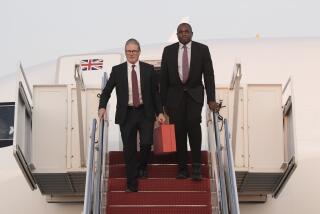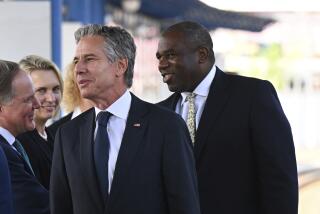Thatcher in Moscow for Crucial Talks
- Share via
MOSCOW — British Prime Minister Margaret Thatcher arrived here Saturday for a five-day visit considered by many to be potentially the most important made by any Western leader in recent years.
Premier Nikolai I. Ryzhkov met her at Moscow’s Vnukovo Airport and took her immediately to the Kremlin for a brief ceremonial greeting by Soviet leader Mikhail S. Gorbachev. In the course of her visit, Thatcher is scheduled to meet Gorbachev on five separate occasions, including a full day of talks Monday.
These talks are expected to focus on major East-West issues, including U.S.-Soviet arms control negotiations; on regional issues, including the Middle East and Afghanistan, and on human rights.
Link to Human Rights
Speaking to reporters aboard her plane en route here, Thatcher linked human rights with arms control, saying, “If a country persists in putting people in prison for their political and religious views, it is something we have to take into account in arms control.”
Her visit takes place amid signs of rapid, extensive change within the Soviet Union and movement toward a U.S.-Soviet agreement that could eliminate medium-range nuclear missiles from European soil.
Although Thatcher is not expected to meet personally with President Reagan immediately after the visit, her impressions and the substance of discussions here will doubtless play a role in U.S. preparations for coming high-level contact with the Soviets.
Foreign Secretary Geoffrey Howe, who is accompanying Thatcher, is expected to brief Secretary of State George P. Shultz in Washington early next month.
Stability Sought
Shultz is scheduled to meet Soviet leaders here April 13-16 here in talks that conceivably could lay the groundwork for a third Reagan-Gorbachev summit.
During the current trip, Thatcher and Gorbachev are also expected to seek ways of stabilizing one of the more volatile bilateral relationships across the East-West divide. Barely 18 months ago, the two nations engaged in a rapid-fire exchange of expulsions and counterexpulsions of each other’s diplomats and other nationals after the defection of the KGB chief in London, Oleg A. Gordievsky.
Her trip marks the first official visit by a British prime minister in 12 years. Thatcher, once attacked so harshly in Moscow street posters that British diplomats based here were forced to protest and seek their removal, remains the zheleznava dama --iron lady. Her image, however, has been sufficiently softened in the Soviet media to reflect improved relations.
She was recently portrayed as a compulsively hard worker who, nevertheless, still finds time to cook her husband’s breakfast each morning.
Delicate Time
Thatcher’s arrival comes at an extremely delicate time in East-West relations and as America’s European allies have begun asserting themselves collectively for the first time on some key issues.
Consultations last week with French President Francois Mitterrand and West German Chancellor Helmut Kohl have heightened Thatcher’s stature to that of a de facto advocate for a broad body of European opinion.
However, Thatcher also is recognized by the Soviet leadership as a close, respected personal friend of Reagan who has influenced his thinking on East-West Issues in the past.
In November, 1984, she persuaded Reagan to commit the United States to a renegotiation of the Anti-Ballistic Missile Treaty before the deployment of any space-based missile defense system.
Missile Superiority
Last year, after meeting with Thatcher following the Reykjavik summit, Reagan placed new emphasis on the need to deal with Soviet superiority in short-range nuclear missiles and conventional weapons in Europe.
British officials have repeatedly said that a major priority of the Moscow talks will be to stress the same concern to Gorbachev.
Thatcher established an apparent rapport with Gorbachev, declaring after their December, 1984, talks in London, “I like Mr. Gorbachev. We can do business together.”
After consultations with Kohl and Mitterrand, she is in a position to stress a more general European concern of the need to link any U.S.-Soviet accord on intermediate-range nuclear missiles with swift movement toward an East-West parity on shorter-range missiles and conventional weapons.
Emigration a Key
“She’ll want to get across the determination of the alliance to achieve agreements without impairing European security,” a Thatcher aide said.
As the first Western leader in nine months to conduct extensive talks with Gorbachev, Thatcher is expected to search for a better understanding of the extent of change currently under way in the Soviet Union and the implications of this change for the West.
“They’ve released a lot of prisoners, and you must pay tribute to them for that,” Thatcher told reporters before her arrival here Saturday. “You’re looking to see if it is the breaking of a new dawn--I hope it is.” But she said that she has received “letter after letter” from her parliamentary constituents on behalf of Soviet citizens who had been detained or refused exit visas.
Thirty minutes before her plane touched down, a family that had appealed to Thatcher for help in their nine-year effort to emigrate was detained by police after demonstrating on the steps of Moscow’s Bolshoi Theatre.
Monday Meeting Scheduled
Ludmilla Yevsukova, 26, said that she and her parents were held two hours after they stood for 10 minutes with signs appealing for permission to leave the Soviet Union. Police told them they were not breaking the law but said the demonstration “looked terrible,” Yevsukova said.
Thatcher is scheduled to meet Gorbachev privately for at least two hours Monday. Afterward, others, including Howe and his Soviet counterpart, Eduard A. Shevardnadze, will join the discussions.
Thatcher is hoping the high-profile visit will go down well at home, where speculation about a general election is growing.
She must call an election before the end of her current five-year-term in June next year, but most political observers expect her to name a date earlier, possibly this spring.
Sidewalk Conversations
Thatcher is expected to underpin Anglo-Soviet relations by concluding commercial agreements worth several hundred million dollars.
She is scheduled to attend church services today at Zagorsk, 40 miles north of Moscow, a city that is the spiritual center of the Russian Orthodox Church.
Later, she plans to meet Soviet citizens in an unusual venture in sidewalk conversations before joining Gorbachev and his wife, Raisa, in the evening for a performance of “Swan Lake” at the Bolshoi.
She also plans to visit the Georgian capital of Tbilisi before returning to London on Wednesday.
More to Read
Sign up for Essential California
The most important California stories and recommendations in your inbox every morning.
You may occasionally receive promotional content from the Los Angeles Times.













